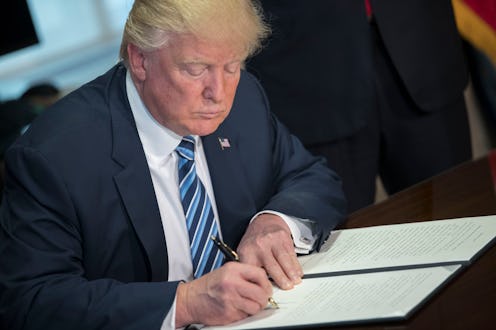News
This Potential Executive Order Could Severely Limit LGBT Rights

Thursday is the annual National Day of Prayer, and the Trump Administration will reportedly celebrate by signing a highly controversial executive order that would expand religious liberty at the expense of LGBT rights. According to Politico, Trump's potential anti-LGBT religious freedom order would essentially make it legal for companies to refuse to provide services to individuals if the service conflicts with the company's religious values. This could have devastating effects for LGBT rights and women's access to contraception.
Politico reported that Trump has invited national conservative and faith leaders to the White House to witness the ceremonial signing of the order, which made headlines in February when a draft copy was leaked to The Nation. According to the draft, the definition of a religious organization would be broadened so that most businesses and individuals could cite "religious freedom" to avoid adhering to policies relating to same-sex marriage, transgender rights, and abortion services.
Since the leak, according to Politico, Vice President Mike Pence, a staunch proponent of religious freedom, has been working with a team of lawyers to revise the language of the bill in recent weeks. Still, one conservative insider told the news site that "the language is still very, very strong."
During his tenure as governor of Indiana, Pence introduced a similar piece of legislation called the Religious Freedom Restoration Act. It was so controversial, it reportedly cost the city of Indianapolis as much as $60 million dollars in lost revenue, according to the state's nonprofit tourism organization, Visit Indy. Pence eventually yielded to public pressure and altered the bill.
Trump's new executive order has the support of social conservatives and religious leaders across the country, who feel that having to provide contraceptives or service same-sex couples infringes upon the Christian values of many companies and employers. Human rights organizations, however, have expressed their opposition, and have promised to fight the executive order in court. The American Civil Liberties Union, Lambda Legal, and other legal advocacy groups have announced plans to sue the federal government to stop the bill from being enforced.
Trump has signed 30 executive orders so far, though many of them have been fraught with legal challenges. Federal judges blocked his controversial travel ban that would place travel restrictions on citizens from several Muslim majority countries, as well as his efforts to pull funding from sanctuary cities that protect immigrants. Given the backlash that Trump is already receiving from LGBT rights groups, allies, and legal organizations, it's quite possible that his latest executive order on religious freedom will end up at the mercy of the courts as well.